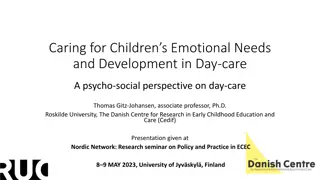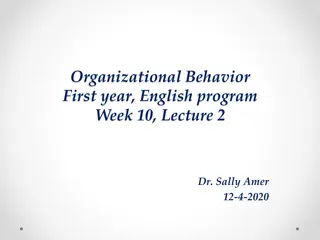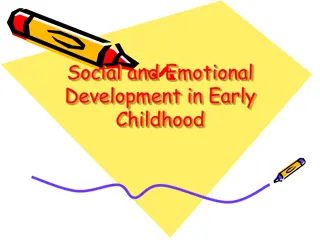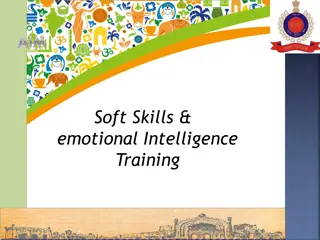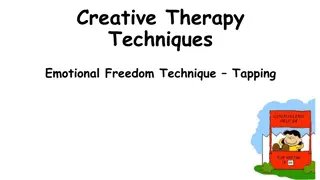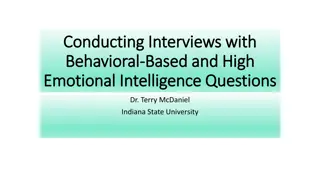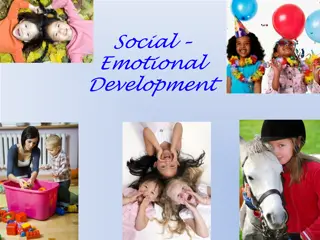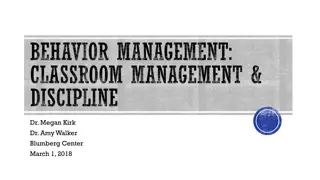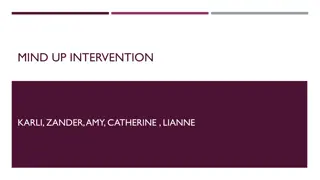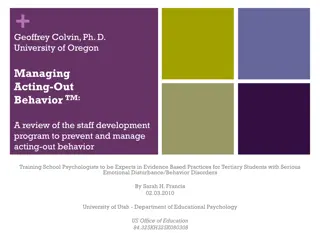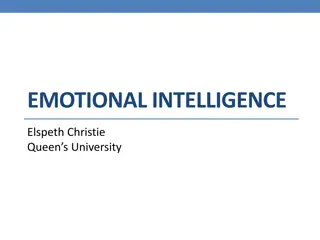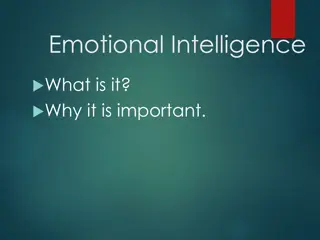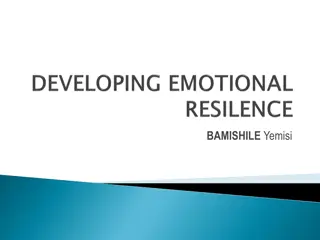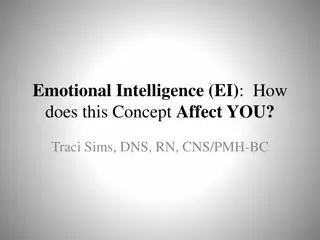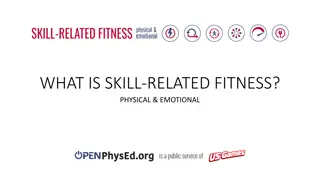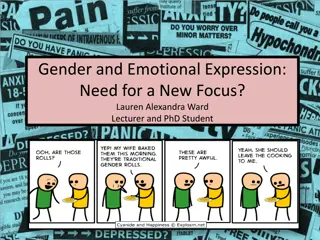Professional Learning Resource for Emotional Regulation and Brain Function
Explore the Inclusion, Wellbeing, and Equalities Professional Learning Framework tailored for Scotland's educators and learners. Dive into the interconnectivity between emotional regulation, brain function, and trauma challenges. Utilize the resource to enhance knowledge, understanding, and support
3 views • 18 slides
Understanding Emotional Patterns in Families
Families play a crucial role in shaping individuals' emotional responses and behaviors. Caregivers influence how we perceive and manage emotions, impacting our emotional well-being. By examining how different emotions are accepted, rejected, and modeled within families, one can gain insights into th
10 views • 14 slides
Understanding Children's Emotional Development in Daycare from a Psycho-Social Perspective
Scientific evidence emphasizes the early onset of emotional development and its profound impact on lifelong outcomes. The quality of childcare processes plays a pivotal role in shaping children's social-emotional development, highlighting the importance of nurturing emotional relationships in daycar
0 views • 10 slides
Understanding Emotional Labor in Organizational Behavior
Emotional labor involves employees expressing organizationally desired emotions during work interactions, impacting job performance. Employees may face emotional dissonance when projecting one emotion while feeling another, leading to surface or deep acting. Affective Events Theory (AET) suggests th
0 views • 19 slides
Understanding Emotional Wellness for Inner Well-Being
Exploring the importance of emotional wellness in cultivating inner well-being, this content delves into the facets of social, mental, and emotional well-being. It emphasizes the significance of acknowledging and accepting our feelings, maintaining a positive outlook, and finding purpose and peace w
1 views • 27 slides
Early Childhood Social and Emotional Development Insights
Social and emotional development in early childhood is influenced by various factors such as family dynamics, parenting styles, peer interactions, and cultural backgrounds. Erikson's stages highlight the importance of initiatives and self-understanding in shaping emotional growth. Parents play a cru
2 views • 35 slides
Comprehensive Soft Skills & Emotional Intelligence Training for Police Officers
This training module aims to equip police officers with soft skills and emotional intelligence, essential for effective communication, conflict resolution, and professional development in policing. It covers understanding concepts, importance of attitude, behavior impact on communication, conflict d
1 views • 26 slides
Understanding Emotional Intelligence in the Workplace
Explore the significance of emotional intelligence in the workplace, its definition, five competencies, case studies, and strategies to enhance skills. Dive into scenarios, role-plays, misconceptions, and why emotional intelligence is crucial for professional success. Learn about managing emotions,
0 views • 33 slides
Understanding Emotional Intelligence: Key Principles and Skills
Emotional intelligence, as presented by David Taylor, is crucial in perceiving, understanding, and managing emotions in oneself and others. It plays a vital role in professional and personal relationships by enhancing emotional awareness, recognition, and management. The principles of emotional inte
1 views • 22 slides
Understanding Human Behavior: Foundations and Factors
Human behavior is a multifaceted subject influenced by genetic makeup, culture, and individual values. It encompasses both overt actions and covert thoughts, a product of the individual and environmental factors. Psychologists study behavior from visible (overt) actions like playing football to inne
0 views • 20 slides
Understanding the Impact of Cortisol on Emotional Expression in Young Children Facing Economic Hardship
This study explores how the stress hormone cortisol is related to emotional expression in young children experiencing economic hardship. Cortisol levels can indicate stress, but prolonged exposure to stress can lead to desensitization. The research focuses on children attending Head Start preschools
0 views • 15 slides
Understanding Emotional Abuse: Signs, Effects, and How to Respond
Explore the intricacies of emotional abuse through the eyes of Dr. Katia Reinert, Associate Director of GCHM. Delve into the techniques used by emotional abusers, self-assessment for identifying abuse, effects of abuse, and guidance on how the Christian community can help. Discover the challenges of
1 views • 31 slides
Understanding Emotional Freedom Technique (EFT) Tapping for Emotional Wellness
Emotional Freedom Technique (EFT) tapping, rooted in acupressure, offers a holistic approach to addressing stress, fear, and phobias. This body-centered therapy draws on ancient Chinese practices, stimulating specific acupoints to improve energy flow. Studies show effectiveness in treating depressio
0 views • 4 slides
Understanding Normal and Abnormal Behavior: Perspectives and Definitions
Normal behavior varies from person to person and society, influenced by individual preferences and societal norms. Abnormal behavior is characterized by an inability to function effectively or personal discomfort. The concept of normality and abnormality in psychology raises complex questions about
2 views • 8 slides
Understanding Human Behavior: Insights for Social Workers
This material delves into the intricacies of human behavior, exploring factors influencing behavior such as heredity, environment, intelligence, needs, and motives. It covers the concept of human behavior, stages in life from conception to old age, and theories of human development by eminent psycho
2 views • 71 slides
Enhancing Emotional Intelligence Through Behavioral Interview Questions
Explore the key aspects of emotional intelligence, including social-emotional competencies and cognitive, affective, and behavioral competencies. Learn how to conduct interviews focused on emotional intelligence and discover the importance of relationships, self-awareness, responsible decision-makin
0 views • 44 slides
Understanding Social and Emotional Development in Young Children
Explore the general emotional patterns and specific emotions in young children aged 4 to 6 years. Understand the positive and negative characteristics such as self-centeredness, independence, anxiety, and fear, and learn how to deal with common fears like imaginary dangers and separation anxiety. Re
1 views • 19 slides
Safeguarding Infants from Emotional Maltreatment: What Works?
Safeguarding infants from emotional maltreatment is crucial during the first two years of life. Emotional abuse, though not always accompanied by physical or sexual abuse, can have severe impacts on a child's development. The paper explores the structure, prevalence, and impact of emotional abuse on
3 views • 59 slides
Understanding Behavior Management in Classroom Settings
Explore the essential topics of behavior management, classroom strategies, and discipline in educational settings. Delve into the functions of behavior, impact of trauma on learning, and effective management techniques. Learn how to identify underlying reasons for student behaviors, discuss behavior
0 views • 76 slides
Targeting Emotions to Facilitate Behavior Change in Older Adults
Efforts in changing health behavior have traditionally focused on social and cognitive factors, but recent evidence highlights the importance of affective states in decision-making and behavior change. Janey Peterson discusses the role of emotions in achieving and sustaining behavior change to benef
0 views • 11 slides
Grading Criteria for Effort and Behavior in Educational Reporting
Effort and behavior in educational settings are evaluated based on criteria ranging from Excellent to Causing Concern. Pupils demonstrating excellent behavior show respect, responsibility, and positive engagement in learning. Those with good behavior exhibit cooperation and respect for others, albei
0 views • 9 slides
Understanding the MindUP Intervention: Enhancing Social-Emotional Awareness and Academic Success
The MindUP Intervention is an evidence-based curriculum focused on fostering social-emotional awareness, enhancing psychological well-being, promoting academic success, and cultivating tolerance for differences. Through practices like deep belly breathing and attentive listening, students learn to s
0 views • 26 slides
PBIS Expectations and Behavior Flowchart
The PBIS flowchart outlines behavior expectations and interventions for minor and major incidents in a school setting. It covers disrespectful behavior, disruption, defiance, property damage, theft, possession of weapons, and more. The flowchart guides teachers and staff on managing and addressing s
0 views • 6 slides
Managing Acting-Out Behavior: A Staff Development Program Review
This review discusses a staff development program created by Geoffrey Colvin, Ph.D., from the University of Oregon, focusing on preventing and managing acting-out behavior in students with emotional disturbance or behavior disorders. The program includes video presentations, strategies for behavior
0 views • 22 slides
Understanding Emotional Intelligence and its Components
Emotional Intelligence is about identifying, understanding, and managing emotions, recognizing your own needs and those of others, and enhancing interpersonal skills. It involves self-perception, self-expression, and affects decision-making and stress management. People with high emotional intellige
0 views • 20 slides
Understanding Adolescent Development and Emotional Intelligence by Finbar Chambers
This collection presents insights on Gardner's Multiple Intelligences, Emotional Intelligence, and the importance of understanding adolescent development. Finbar Chambers explores emotional makeup, behavior management strategies, and the transition to independence during adolescence. Discover the im
0 views • 20 slides
Function-Based Behavior Support Plans: A Comprehensive Guide
Explore the process of developing Function-Based Behavior Support Plans (BSP) using Functional Behavioral Assessment (FBA). Understand the concepts of function and functional behavior assessment, learn how FBA/BSP fits within a multi-tiered support system, and practice developing BSP for students. D
0 views • 74 slides
Understanding Emotional Labour in Probation Practice
Explore the concept of emotional labour in probation practice, highlighting the management of emotions, impact on research and practice, links to burnout, and the role of managerialism and rationality. Delve into emotional work, Chamberlayne's 'emotion work', and feeling rules associated with emotio
0 views • 16 slides
Importance of Emotional Intelligence in Religious Leadership
Religious leaders benefit greatly from high emotional intelligence, leading to better performance, increased staff retention, and a more positive work environment. Emotional intelligence plays a vital role in pastoral ministry, enhancing emotional care for congregants. Educational programs focusing
0 views • 15 slides
Understanding Emotional Intelligence: An Overview
Emotional Intelligence (EI) is a crucial aspect of human behavior that encompasses the ability to perceive, use, understand, and manage emotions effectively. Originating from scholarly research dating back thousands of years, EI became popularized in 1990 by John Mayer and Peter Salovey. This articl
0 views • 15 slides
Understanding Emotional Intelligence in the Workplace
Emotional intelligence plays a crucial role in professional success, impacting how we lead teams, handle pressure, and build relationships. This webinar explores the definition of emotional intelligence, its significance in the workplace, and practical ways to enhance it. Discover the key elements o
0 views • 14 slides
Understanding Emotional Intelligence: Definition, Importance, and Examples
Emotional intelligence, a term that originated in the 1960s, refers to the ability to recognize and manage emotions in oneself and others effectively. It involves identifying emotions, understanding their impact, and using this awareness to guide behavior. Emotional intelligence is crucial for perso
0 views • 35 slides
Enhancing Emotional Resilience: Key Strategies and Benefits
Exploring the concept of emotional resilience, this content covers the definition of emotions, emotional resilience, and the domains of resilience. It delves into the importance of emotional resilience, ways to improve it, and how it helps individuals bounce back from adversity, maintain balance, an
0 views • 17 slides
Exploring the Ups and Downs of Emotional Health Throughout the Day
Dive into a visual journey depicting the ebb and flow of emotional well-being in a day, from morning reflections to evening introspections. Experience different facets of emotional health through images, timelines, and audio clips, offering insights to nurture your mental and emotional well-being.
0 views • 7 slides
The Impact of Emotional Intelligence in Nursing Practice
Emotional intelligence plays a crucial role in nursing, influencing personal well-being, patient outcomes, and stress management. Nurses with higher emotional skills are better equipped to navigate the challenges of their profession. Understanding the history and significance of emotional intelligen
0 views • 23 slides
Performance Development: Emotional Factors and Strategies
Understanding emotional factors in performance development, collecting relevant information, utilizing positive self-talk for emotional development, and the importance of monitoring and evaluating performance for continual improvement and targeted training. Visual aids complement the explanation of
0 views • 4 slides
SEB Screener Reviews for Delaware Educators
SEB Screener Reviews were developed for the DE-PBS Project in Spring 2022 to support Delaware educators in building knowledge and skills in Positive Behavior Support (PBS). The project aims to create safe and caring learning environments that promote social-emotional and academic development. The sc
0 views • 56 slides
Social-Emotional Health and Resilience of Teachers in East European Countries
This study explores the social-emotional health and resilience of teachers in Latvia, Lithuania, and the Slovak Republic as part of an Erasmus+ project aimed at developing a digital support system to promote their well-being. The interplay between mental health, social-emotional health, and resilien
0 views • 30 slides
Understanding Skill-Related Fitness: Physical and Emotional Aspects
Skill-related fitness encompasses both physical and emotional components, such as agility, balance, coordination, power, reaction time, and speed. Physical agility involves quick body movements, while emotional agility relates to positive responses in various situations. Physical balance requires we
0 views • 7 slides
Gender and Emotional Expression: A New Perspective on Identity and Mental Health
Exploring the societal constructs of gender and their impact on emotional expression, this study delves into the Gender Roles Hypothesis, challenges traditional norms around emotional display, and examines the correlations between gender and mental health outcomes. The research sheds light on the ne
0 views • 15 slides


